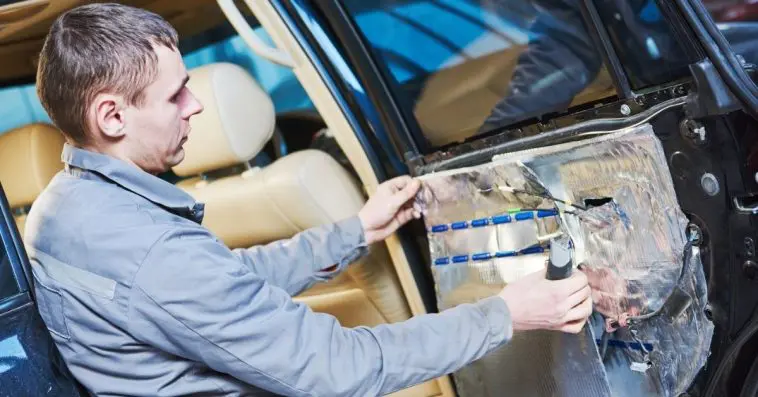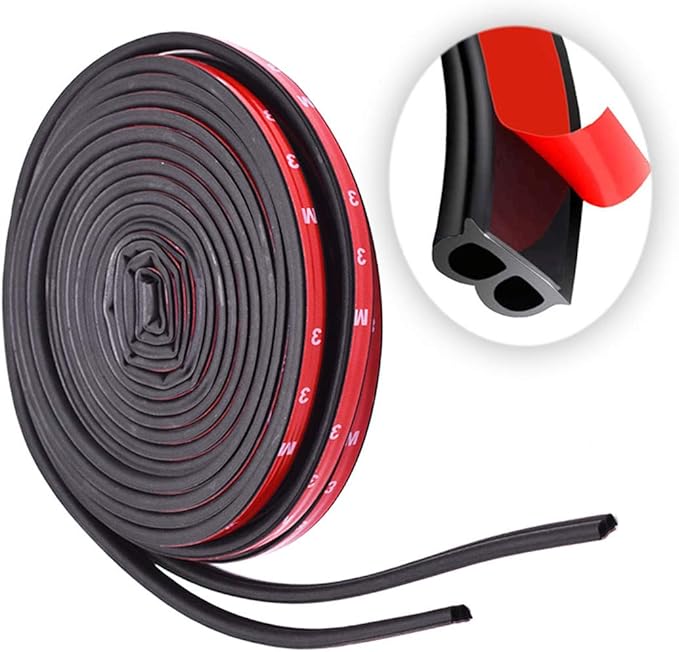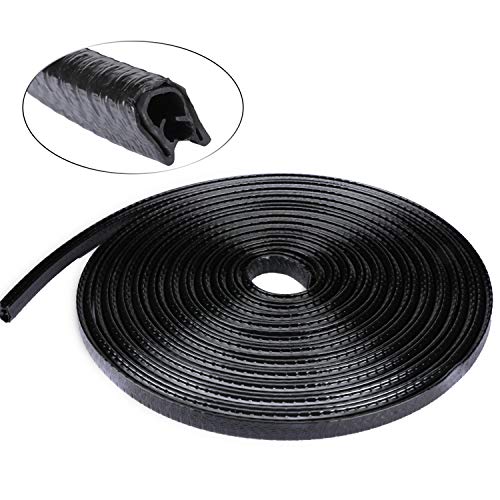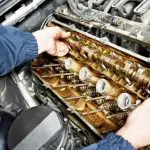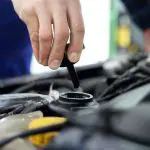I just noticed how difficult it is to enjoy a song or to hold a conversation in my car.
The road noise makes it an absolutely horrible experience for me. This had me researching and put together an article that will help you in soundproofing car road noise.
Coming to the question, how to quiet road noise in a car, you can do it in a few ways:
- Undercoat Your Car
- Vibration Dampeners
- Soundproof The Floor
- Soundproof The Door
- Soundproof The Hood
- Soundproof The Trunk
- Spray Sound Deadener
- Change The Rubber Seals
- Replace The Car Tires
- Car Door Edge Seal Protector
- Insulate The Car Roof
- Reinforce The Car Windows
- Check Your Engine
- Inspect The Car Exhaust
While you cannot block the sound completely, you can reduce it to an extent.
And it’s not by just one means, but a combination of the above (as needed) that will give you good soundproofing. It is easier than you think and gives you peace of mind when you drive.
TABLE OF CONTENTS
How To Reduce Road Noise In Your Car
Soundproofing your car is not limited to one section. You have to consider the entire vehicle and arrive at a solution that will give you good insulation from the road noise.
1. Undercoat Your Car
It is quite obvious that the underside of your car definitely plays a part in transmitting the road noise to the cabin. The best way to soundproof it is undercoating.
Undercoating is the method of spraying rubberized material to the underside. It bonds well to provide you with soundproofing as well as protecting the car from rust, dirt, and grime.
But before that, you need to make sure that the underside of the vehicle is clean. If not, the undercoating can trap in more moisture and make it a nightmare for you.
You can do the undercoating yourself in about 5-6 hours for just $100, but if it sounds scary, you can get it done at a service center.
Search online for car soundproofing near me, and it will give you details where you can get it done for $150-$200.
2. Vibration Dampeners
Sound travels using vibration regardless of the medium.
Hence, if you could dampen the vibrations, you can bring down the noise levels inside your car to a great extent. This is what we hope to reduce.
The vibration dampeners can be any material, but it should be thick enough to reduce the outside noise.
As with every soundproofing material, mass plays a huge part here since the undercarriage of the car isn’t that thick. It clamps the vibrations that you feel through the floor of your automobile.
The product I use and the one I consider the best is Dynamat. One pack contains 9 sheets measuring 4 square feet each.
One pack can soundproof 1/4th of a sedan, and it is also one of the few products that are heat resistant.
Dynamat and other products like it have butyl rubber with a foil constraint layer on top of an adhesive, which helps it to stick anywhere.
Unfortunately, it is expensive, and not everyone is ready to shell $170 for a product that doesn’t even cover the entire car. You can also go for budget-friendly alternatives such as FatMat.
3. Soundproof The Floor
Dynamat or any products that help in soundproofing car floor works best if applied to the floor underneath the floor mats, especially in the front of the car.
Most of the sound comes through here since the engine is in the front. And also due to the seats being closer to the front. You can also add them to the back for extra sound reduction.
4. Soundproof The Door
Soundproofing car doors reduce the vibrations produced during the drive, which in turn quietens road noise.
The door is usually quite thin, with very little insulation. So, adding Dynamat to your door helps in road noise reduction to a large extent.
It is a huge undertaking since the material needs to be cut according to the specification.
Care needs to be taken such that it doesn’t hinder the circuitry and the moving parts inside. But once done, you can see a drastic reduction of road noise inside the car.
5. Soundproof The Hood
The source of all sounds from the car is the engine, even a noiseless one like in Tesla.
Any car as it ages produces more noise as the parts are subjected to wear and tear. Though you can handle the engine noise, it will not be completely quietened.
What you need is a Dynamat lined in the underside of the hood of the car. It absorbs all the vibrations from the engine, which produce sound.
6. Soundproof The Trunk
Dynamat again plays an important part in soundproofing car trunk. If your car has a small trunk it probably doesn’t matter, but a larger one needs Dynamat lining.
The reason is that it acts as a diaphragm and amplifies every vibration that comes in from the underside.
Cut Dynamat or Fatmat (if you are looking at inexpensive options) into suitably sized pieces under the mat.
7. Spray Sound Deadener
Sound deadener sprays should be used in collaboration with mats to achieve the ultimate soundproofed car.
It is designed for use in spaces that are difficult to get to and any place that is too tiny for a mat.
These sound deadening products come in both aerosolized spray cans and professional versions that need a compressor and a paint gun.
As with paint, you need to make sure that the surface is clean before application.
While these are perfect for small areas, you cannot use them to soundproof your entire car since it just dampens the noises. It should be used along with mats, which are mentioned earlier.
Soundproofing foam, on the other hand, works to absorb the vibration just like the mat. It also absorbs the echo making your music louder and clearer.
8. Change The Rubber Seals
Any gap in the car door lets in the wind noise, especially when you drive the car faster on the highways.
You may hear it as a whistling noise, which is the wind leaking through the gaps in the door.
The main reason could be the gaskets or the seals, which run around the car door. If it doesn’t seal properly, you could be hearing an increased amount of noise.
While this is not an effective way to soundproof the car, it plays an important part in blocking the wind noise seeping inside.
The rubber seals are available to buy from Amazon, and installing them is also quite easy, even for a novice.
Remove all the traces of old seals from the doors; Apply glue and place the new ones over it. Wait for them to dry before closing the door.
9. Replace The Car Tires
Your tire also contributes to the noise level inside your vehicle. For those asking me how to reduce road noise from tires, your tire should have the following qualities for a quieter cabin.
- Narrow tires
- Soft rubber
- Small gaps between grooves
- Little grooves for traction
Apart from these, another issue that causes noises are worn-out tires, especially if they are uneven.
If a tire starts making noise, it is better if you get them checked since, in most cases, one of them would have a more shallow tread than the others.
Not just considering the sounds, but it not safe also. It is easy to lose balance without a good grip. You can face the same issue with cheap tires and unaligned tires too.
10. Car Door Edge Seal Protector
Even if your seal is in pristine condition, wind noise can leak through the gaps in the seal, mainly at the edges of the door when it is closed.
To prevent that, you can use a seal protector to give a tight seal against the noises from outside. It also gives an elegant finish to the car and protection from bumps and nicks.
11. Insulate The Car Roof
If you are looking to block every way road noise enters the car, you might want to insulate the car roof too.
While it is not high in priority, you might want to consider if you are looking at all the options.
There is not much noise coming in from the roof than from the door, windows, floor, underside, and hood.
Soundproofing the roof includes removing the existing lining and adding a sound deadening material for cars.
12. Reinforce The Car Windows
Reinforcing the windows will give you a better noise-free environment in your car, but it requires extensive modification. So, I’d suggest you skip this unless needed.
You would have to change the window slot to incorporate the thicker window and maybe redo the circuitry in case of power windows.
13. Check Your Engine
Your engine should be as noiseless as it can be. If you notice any unusual noise coming from the car, it is time to get it checked at a service center.
The reason for the above may be due to dirty oil circulating in the engine.
Dirty oil has the texture of the sludge and cannot lubricate the parts as well as clean oil. This can cause the engine to be noisy due to the friction caused by the moving parts.
Also, check for worn-out parts, particularly if your engine overheats along with making noise.
If caught early, you can save quite a lot of bucks. You might also want to get your suspension parts checked out while at the mechanic.
14. Inspect The Car Exhaust
Modern cars nowadays are designed such that they do not make much noise compared to older cars.
However, if the exhaust system rusts and develops holes over time, you may notice the car becoming noisier.
Get your car checked out at the mechanic; he may opt to replace the exhaust system or repair it depending on the damage.
What Is The Road Noise?
Road noise can be defined as the noise produced by your car when driven on even and uneven surfaces.
When the tires hit any bumps or pits in the road, the parts of the vehicle can rattle and shake, leading to road noise.
Road noise can be of two types:
- External Noise
- Internal Noise
External Noise
External noise doesn’t affect the people inside the car as much as it affects pedestrians and cyclists, though the cause of the noise is the vehicle itself.
It may be the sound of the tires, horns, exhaust, suspension, or so. If you want to eliminate this, all you need to do is to drive slowly and do regular maintenance.
Internal Noise
Internal noise is the noise heard by the driver and the passenger of the vehicle. The main sources of this are:
- Road Noise: Coming from the tires and the rattling of the car parts
- Wind Noise: The sound of the wind hitting the car
- Engine Sound: The sound made by a running engine, which can be heard only inside the cabin
FAQs
Q1. Is Soundproofing My Car Worth It?
Yes! It is worth it, especially if you are spending over an hour or two driving back and forth from work.
It can be irritating when you have to hear the road noises continuously without being able to enjoy a conversation or music.
Q2. Why Is It Not Possible To Completely Soundproof A Car?
Effective soundproofing depends on the mass of the material used. With mass comes weight, which is not ideal for any car.
It would affect the performance of the vehicle. The only option is to use sound deadeners, vibration dampeners, etc.
Q3. How Much Would It Cost To Soundproof My Car?
Soundproofing your car would cost anywhere from $600-$800. It depends on the size of your vehicle, the material used, and also the area you want to be soundproofed.
Conclusion
Road noise is unavoidable. Whatever the circumstance is, you would be able to hear at least part of the noise even in a soundproofed car.
But if the current levels are too high for you, try soundproofing or insulating your car.
There are various methods by which you can soundproof your car, but these should be done in harmony to achieve the best result.
There are various materials and brands available in the market which cater to soundproofing car road noise. But it depends on you to choose your materials wisely.
My recommendation would be to go with the vibration dampener and to use a sound deadener for the gaps and crevices.


